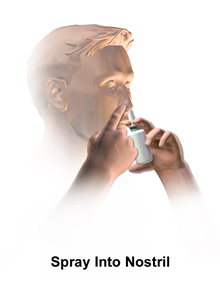
Recently, a study conducted by Cleveland Clinic was published in the Journal of Allergy and Clinical Immunology. According to this study, severe COVID-19 infection was less likely to develop in subjects who used steroidal nasal sprays on a regular basis. These sprays were so effective that they reduced the chances of hospitalization and mortality by as much as 25%. Researchers at the Cleveland Clinic investigated 72,147 cases of COVID-19: all the patients were 18 years and above in terms of age. This is a very recent study that was conducted between April 1, 2020 and March 31, 2021.
The study cohort of patients included 12,608 hospitalized cases. Among them, as much as 2,935 cases were admitted to intensive care unit (ICU). Finally, the number of patients who died in hospital included 1,880. Interestingly, as much as 10, 187 patients were regularly using steroidal nasal sprays, which are nothing but corticosteroids administered through intranasal route. These patients used nasal sprays even before getting infected with COVID-19. Therefore, the chances of hospitalization declined by as much as 22% in these patients. Moreover, the need for ICU admission decreased by about 23% in these patients. Finally, the chances of dying in the hospital decreased by about 24%, as compared to patients who did not use steroidal nasal sprays.
These findings are quite encouraging to patients who regularly used intranasal corticosteroids. However, it does not mean that these corticosteroids are quite effective in treating and preventing COVID-19 disease. Yes, this seems contradictory but true. But several reports have endorsed the fact that in vitro use of intranasal corticosteroid would effective reduce the expression of ACE2, a protein receptor associated with SARS-CoV-2 virus. Thus, the virus would enter the cells and cause the spread of COVID-19. Nasal sprays contain corticosteroids, which belong to steroidal family of drugs. These nasal sprays are usually inhaled to control several nasal infections, such as stuffy nose, allergies, severe cold, etc.
Intranasal corticosteroids are either sold over the counter or with the help of prescription. However, researchers still do not know the exact mechanism through which these nasal sprays control COVID-19 infection. The findings of this study were coupled with the fact that the expression of ACE2 was highest in the mucosal lining of the nose. Based on this, researchers developed the following hypothesis: the viral load and the expression of ACE2 receptor can be suppressed in the nose with the use of intranasal corticosteroids, making them quite effective against severe COVID-19 infection. However, future studies must be conducted to validate the hypothesis.
